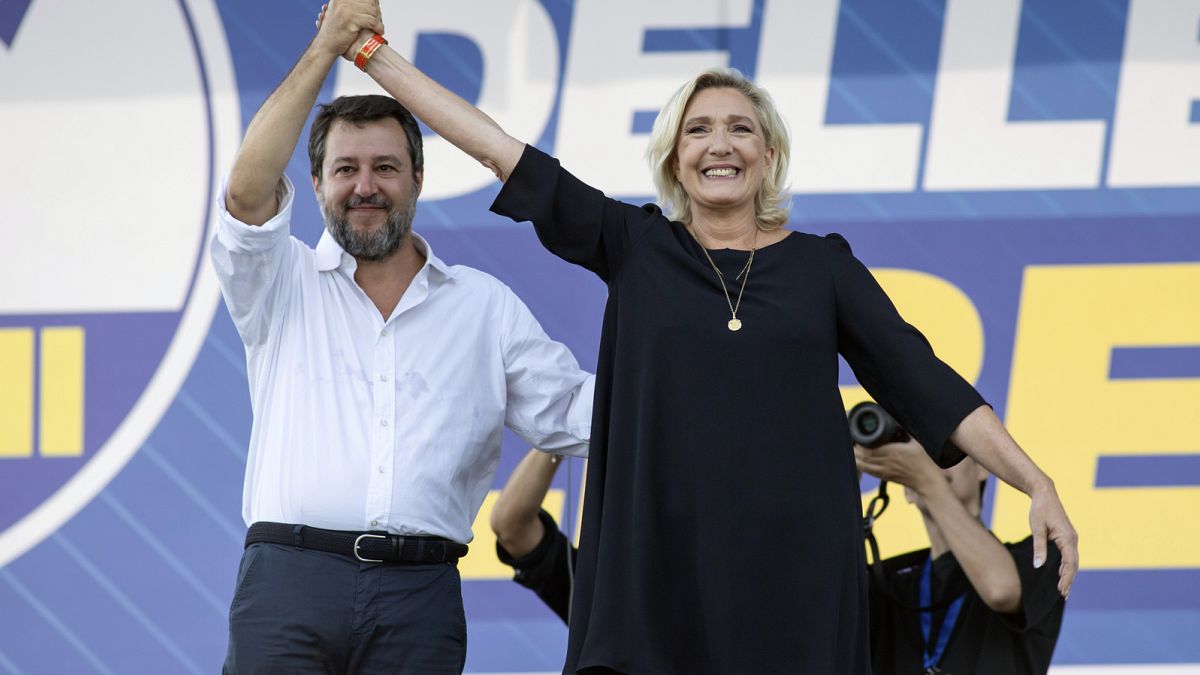Six months ahead of the EU elections, polls predict strong results for the two most right-leaning groups in the European Parliament.
December polling by aggregator Europe Elects suggests that, if combined, the far-right Identity and Democracy (ID) group and the eurosceptic European Conservatives and Reformists (ECR) could muster enough support to match the size of the centre-right European People's Party - currently the parliament's largest group.
But the poll also predicts that the informal coalition between the centre-right European People’s Party (EPP), the centre-left Socialists and Democrats (S&D) and centrist-liberal Renew Europe (RE) will still retain its comfortable absolute majority, with 404 out of 705 seats.
However, the coalition may still face some stiff competition if Europe's far right parties continue to see support grow.
The Identity and Democracy (ID) group has gained 12% in its seat projection according to Europe Elects' poll, taking it to its highest level since February 2020. French National Rally leader Marine Le Pen, and Italian Deputy Prime Minister Matteo Salvini - both prominent eurosceptics - belong to the party.
The European Conservatives and Reformists (ECR) are also slightly up, at 11%. The group has been buoyed by the recent electoral success of its member party Brothers of Italy, whose leader Giorgia Meloni became Italy's first female premier in October 2022. Poland's Law and Justice party and Spain's far-right Vox party also belong to the ECR.
The projections could spell trouble for Europe's main parties.
"If you combined the two [ID and ECR], disregarding the likelihood of those two forming a group together, which is one of the things that people are discussing, and that would be a result of 23%, which would be around the same as the result of the European People's Party, the centre right," Jakub Rogowiecki, analyst at Europe Elects, told Euronews.
But there are barriers to far-right parties uniting - namely, their ideological differences on issues from the war in Ukraine, to migration, or even European integration.
"This could lead to a cooperation on specific issues to change the tone and the decisions on European level, as well as the general swift to the right-wing policies," Rogowiecki explained. "Matters such as migration especially, are ones that are quite of the main driving factors for people going ahead with policies, which is why even if there is no merger between ECR, ID and Fidesz this could certainly affect the coalition that could be formed up the next election."
Hungarian Prime Minister Viktor Orban pulled out his ruling Fidesz party from the main centre-right EPP group in 2021, two years after the party was suspended by the EPP's political alliance.
Deals could be struck if Parliament swings in favour of some - Manfred Weber, President of the EPP, for example, has been insistent on cooperation with ECR in recent months. Weber has called on the European Parliament to wrap up the New Pact on Migration and Asylum before Europeans go to the polls so that governments have something to show to sceptical voters.
Weber's approach has been criticised by the Socialists and the Greens as an attempt to pacify the far-right and mimic its radical agenda under a veneer of centrism.
But several parties that belong to the EPP have in recent years entered coalition agreements with far-right formations in order to reach power.
Not only are the parties divided, but so are the European member states. The vote for the European elections goes through the national perspective - which can often differ greatly between member states.
